TUTOR1 STUDYHUB
BEST RELIABLE AND TRUSTWORTHY STUDYMATERIALS
- 857
- 0
- 0
Community
- Followers
- Following
1 Reviews received
857 items
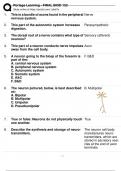
Portage Learning - FINAL BIOD 152
Portage Learning - FINAL BIOD 152 Study online at 1. This is a bundle of axons found in the peripheral nervous system. Nerve 2. This part of the autonomic system increases digestion. Parasympathetic 3. The dorsal root of a nerve
- Exam (elaborations)
- • 40 pages •
Portage Learning - FINAL BIOD 152 Study online at 1. This is a bundle of axons found in the peripheral nervous system. Nerve 2. This part of the autonomic system increases digestion. Parasympathetic 3. The dorsal root of a nerve
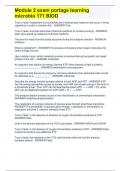
Module 2 exam portage learning microbio 171 BIOD True or false
Module 2 exam portage learning microbio 171 BIOD True or false: metabolism is a controlled set of biochemical reactions that occur in living organisms in order to maintain life. - ANSWER-True True or false: enzymes slow down chemical reactions to conserve energy - ANSWER-false, they speed up (catalyze) chemical reactions The term for metal ions that assist enzymes during the catalysis reaction - ANSWER-cofactors What is catabolism? - ANSWER-The process of breaking down larger
- Exam (elaborations)
- • 3 pages •
Module 2 exam portage learning microbio 171 BIOD True or false: metabolism is a controlled set of biochemical reactions that occur in living organisms in order to maintain life. - ANSWER-True True or false: enzymes slow down chemical reactions to conserve energy - ANSWER-false, they speed up (catalyze) chemical reactions The term for metal ions that assist enzymes during the catalysis reaction - ANSWER-cofactors What is catabolism? - ANSWER-The process of breaking down larger
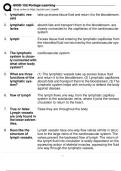
BIOD 152 Portage Learning
BIOD 152 Portage Learning Study online at 1. lymphatic vessels take up excess tissue fluid and return it to the bloodstream. 2. lymphatic capillaries absorb fats and transport them to the bloodstream, are closely connected to the capillaries of the cardiovascular system 3. lymph Excess tissue fluid
- Exam (elaborations)
- • 8 pages •
BIOD 152 Portage Learning Study online at 1. lymphatic vessels take up excess tissue fluid and return it to the bloodstream. 2. lymphatic capillaries absorb fats and transport them to the bloodstream, are closely connected to the capillaries of the cardiovascular system 3. lymph Excess tissue fluid
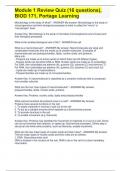
Module 1 Review Quiz (16 questions), BIOD 171, Portage Learning
Module 1 Review Quiz (16 questions), BIOD 171, Portage Learning Microbiology is the study of what? - ANSWER-My answer: Microbiology is the study of microorganisms and their biological processes at what is called the "micro" or "microscopic" level. Answer Key: Microbiology is the study of microbes (microorganisms and viruses) and their biological processes. What is the smallest biological unit of life? - ANSWER-the cell What
- Exam (elaborations)
- • 4 pages •
Module 1 Review Quiz (16 questions), BIOD 171, Portage Learning Microbiology is the study of what? - ANSWER-My answer: Microbiology is the study of microorganisms and their biological processes at what is called the "micro" or "microscopic" level. Answer Key: Microbiology is the study of microbes (microorganisms and viruses) and their biological processes. What is the smallest biological unit of life? - ANSWER-the cell What
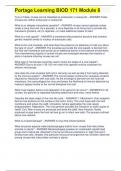
Portage Learning BIOD 171 Module 6 True or False
Portage Learning BIOD 171 Module 6 True or False: viruses can be classified as prokaryotic or eukaryotic - ANSWER-False. Viruses are neither prokaryotic or eukaryotic What is an obligate intracellular parasite? - ANSWER-viruses cannot replicate unless inside a living host cell. As a parasite, a virus depends on its living host to provide the framework (proteins, etc) to replicate—to make additional copies of itself. What is a viral capsid? - ANSWER-a membrane-like protective structure that
- Exam (elaborations)
- • 7 pages •
Portage Learning BIOD 171 Module 6 True or False: viruses can be classified as prokaryotic or eukaryotic - ANSWER-False. Viruses are neither prokaryotic or eukaryotic What is an obligate intracellular parasite? - ANSWER-viruses cannot replicate unless inside a living host cell. As a parasite, a virus depends on its living host to provide the framework (proteins, etc) to replicate—to make additional copies of itself. What is a viral capsid? - ANSWER-a membrane-like protective structure that
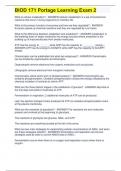
BIOD 171 Portage Learning Exam
BIOD 171 Portage Learning Exam 2 What is cellular metabolism? - ANSWER-Cellular metabolism is a set of biochemical reactions that occur in living organisms to maintain life. What is the primary function of enzymes and how are they regulated? - ANSWER-Enzymes speed up chemical reactions and they are regulated by a co factor. What is the difference between catabolism and anabolism? - ANSWER-Catabolism is
- Exam (elaborations)
- • 5 pages •
BIOD 171 Portage Learning Exam 2 What is cellular metabolism? - ANSWER-Cellular metabolism is a set of biochemical reactions that occur in living organisms to maintain life. What is the primary function of enzymes and how are they regulated? - ANSWER-Enzymes speed up chemical reactions and they are regulated by a co factor. What is the difference between catabolism and anabolism? - ANSWER-Catabolism is
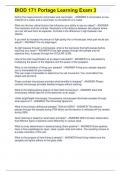
BIOD 171 Portage Learning Exam
BIOD 171 Portage Learning Exam 3 Define the measurements micrometer and nanometer. - ANSWER-A micrometer is one-millionth of a meter and a nanometer is one-billionth of a meter. What are the two critical factors that influence your ability to see an object? - ANSWER-The resolution and the contrast. Resolution is the distance between two objects where you can still see them as separate. Contrast is the difference in light between two
- Exam (elaborations)
- • 4 pages •
BIOD 171 Portage Learning Exam 3 Define the measurements micrometer and nanometer. - ANSWER-A micrometer is one-millionth of a meter and a nanometer is one-billionth of a meter. What are the two critical factors that influence your ability to see an object? - ANSWER-The resolution and the contrast. Resolution is the distance between two objects where you can still see them as separate. Contrast is the difference in light between two
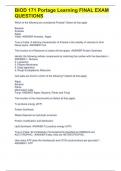
BIOD 171 Portage Learning FINAL EXAM QUESTIONS
BIOD 171 Portage Learning FINAL EXAM QUESTIONS Which of the following are considered Protista? Select all that apply Bacteria Ameoba Algae Yeast -ANSWER-Ameoba , Algae True or False. A defining characteristic of Protista is the inability of colonies to form tissue layers -ANSWER-True The function of a Ribosome is (select all that apply) -ANSWER-Protein Synthesis
- Exam (elaborations)
- • 4 pages •
BIOD 171 Portage Learning FINAL EXAM QUESTIONS Which of the following are considered Protista? Select all that apply Bacteria Ameoba Algae Yeast -ANSWER-Ameoba , Algae True or False. A defining characteristic of Protista is the inability of colonies to form tissue layers -ANSWER-True The function of a Ribosome is (select all that apply) -ANSWER-Protein Synthesis
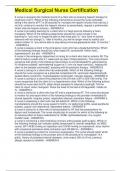
Medical Surgical Nurse Certification
Medical Surgical Nurse Certification A nurse is reviewing the medical record of a client who is receiving heparin therapy for treatment of DVT. Which of the following interventions should the nurse anticipate taking if the client's aPTT is 96 seconds?a. Increase the heparin infusion flow rate by 2 mL/hrb. continue to monitor the heparin infusion as prescribedc. request a prothrombin timed. stop the heparin infusion - ANSWER-d A nurse is providing teaching for a client who is 2 days post-op fol...
- Exam (elaborations)
- • 13 pages •
Medical Surgical Nurse Certification A nurse is reviewing the medical record of a client who is receiving heparin therapy for treatment of DVT. Which of the following interventions should the nurse anticipate taking if the client's aPTT is 96 seconds?a. Increase the heparin infusion flow rate by 2 mL/hrb. continue to monitor the heparin infusion as prescribedc. request a prothrombin timed. stop the heparin infusion - ANSWER-d A nurse is providing teaching for a client who is 2 days post-op fol...
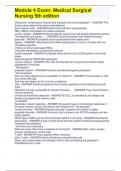
Module 4 Exam: Medical Surgical Nursing 5th edition
Module 4 Exam: Medical Surgical Nursing 5th edition Where are t-lymphocytes matured and released into the bloodstream? - ANSWER-The thymus gland (behind the sternum/breastbone) Bone marrow (red) - ANSWER-blood cell production (hemopoiesis) RBC, WBCs, And platlets are made/ produced Lymph vessels - ANSWER-Remove leftover plasma that has already delivered nutrients The adenoids and tonsils..... - ANSWER-Guard the airway from inhaled microbes adenoids - ANSWER-lymphoid tissue located behind the n...
- Exam (elaborations)
- • 4 pages •
Module 4 Exam: Medical Surgical Nursing 5th edition Where are t-lymphocytes matured and released into the bloodstream? - ANSWER-The thymus gland (behind the sternum/breastbone) Bone marrow (red) - ANSWER-blood cell production (hemopoiesis) RBC, WBCs, And platlets are made/ produced Lymph vessels - ANSWER-Remove leftover plasma that has already delivered nutrients The adenoids and tonsils..... - ANSWER-Guard the airway from inhaled microbes adenoids - ANSWER-lymphoid tissue located behind the n...

PN HESI EXIT EXAM 2023/2024 LATEST VERSION QUESTIONS AND ANSWERS BEST GRADED A+ ASSURED SUCCESS FOR NURSING 1)
BEST SELLER